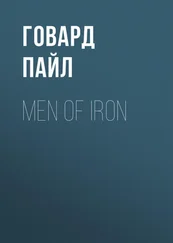Говард Пайл - Within the Capes
Здесь есть возможность читать онлайн «Говард Пайл - Within the Capes» — ознакомительный отрывок электронной книги совершенно бесплатно, а после прочтения отрывка купить полную версию. В некоторых случаях можно слушать аудио, скачать через торрент в формате fb2 и присутствует краткое содержание. Жанр: foreign_antique, foreign_prose, на английском языке. Описание произведения, (предисловие) а так же отзывы посетителей доступны на портале библиотеки ЛибКат.
- Название:Within the Capes
- Автор:
- Жанр:
- Год:неизвестен
- ISBN:нет данных
- Рейтинг книги:5 / 5. Голосов: 1
-
Избранное:Добавить в избранное
- Отзывы:
-
Ваша оценка:
- 100
- 1
- 2
- 3
- 4
- 5
Within the Capes: краткое содержание, описание и аннотация
Предлагаем к чтению аннотацию, описание, краткое содержание или предисловие (зависит от того, что написал сам автор книги «Within the Capes»). Если вы не нашли необходимую информацию о книге — напишите в комментариях, мы постараемся отыскать её.
Within the Capes — читать онлайн ознакомительный отрывок
Ниже представлен текст книги, разбитый по страницам. Система сохранения места последней прочитанной страницы, позволяет с удобством читать онлайн бесплатно книгу «Within the Capes», без необходимости каждый раз заново искать на чём Вы остановились. Поставьте закладку, и сможете в любой момент перейти на страницу, на которой закончили чтение.
Интервал:
Закладка:
His wish was to ship to the West Indies, if he could, as that did not seem so far away from home.
Mr. Lovejoy was at his desk when Tom came into the office; a great pile of letters and papers were in front of him, which he was busy in looking over. He shook hands cordially with the young man and bade him be seated. Tom told him what he wanted, and Mr. Lovejoy listened to him very pleasantly. When he was done, the old gentleman said frankly that there was a poor chance of his getting any berth just then, for that no shipping was being done, the Delaware having been blockaded since the first of the year.
Mr. Lovejoy did not know at that time that the blockade had been raised, for it was not until a week or so afterward that the despatch came to Philadelphia telling how Beresford had tried to land for water at Lewestown, in Delaware, and not being able to do so, had given up the whole business as an ill piece of work and had sailed away to the Bermudas.
Mr. Lovejoy furthermore told Tom that there were three privateers being fitted up at the docks, one of which was about ready to sail.
In those days there was a great deal of feeling against privateering, and I cannot say that it was altogether ill-grounded, for some very cloudy things were done by certain vessels that sailed under letters of marque.
Mr. Lovejoy was a fine looking old gentleman, with a very red face and very white hair, which was tied behind into a queue with a black silk ribbon. He was never seen dressed in anything but plain black clothes with bright silver buttons, black silk stockings and pumps. His frilled shirt front stood out like a half moon and was stiffly starched and as white as snow.
After Tom and he had talked a little while together, he arose, and going to a closet in the side of the chimney place, brought out a decanter of fine old sherry and two glasses, both of which he filled. Tom Granger was not fond of wine, not from any conscientious feeling, but because that the taste was not pleasant to him. Still, he took his glass of wine and drank it too, for it is never well to decline favors from men in power, like Mr. Nicholas Lovejoy.
After the old gentleman had finished his glass of wine, he drew out his fine cambric handkerchief and wiped his lips.
“Tom,” said he.
“Sir,” said Tom.
“Why don’t you ship on board of a privateersman?”
“I couldn’t do it, sir,” said Tom.
“Why not?”
“Well, sir; it may sound very foolish of me to say so, but the truth is that I don’t like the fighting.”
“Don’t like the fighting!” said Mr. Lovejoy, raising his eyebrows. “Come, Tom, that won’t do. Why, when that junk attacked the Quaker City off Ceylon, there was not a man aboard that fought like you. Captain Austin told me all about it, though you would never do so, and I haven’t forgotten it. And now you pretend to tell me that you are afraid.”
“No, sir,” said Tom Granger, very hot about the ears; “it ain’t that; it’s the kind of fighting that I don’t like. When such a junkfull of coolies as that was came down on us, a man was bound to fight for his own life and the lives (and more beside) of the women aboard, and there was no great credit to him in doing it. If the worst came to the worst, I wouldn’t so much mind entering the navy, but I don’t like the notion of going out to run foul of some poor devil of a merchant captain, who, maybe, has all of his fortune in his ship, – and that’s the truth sir.”
“But, Tom, the navy does the same thing.”
“Yes, sir,” said Tom, “but they do it for the sake of war, while privateers go out for their own gain alone. I don’t see, sir, that they are so very much better than pirates, except that they don’t do so much murder and that the law allows them.”
At this, Mr. Lovejoy’s face began to grow a little bit redder than usual. “Very well,” said he, getting up and standing with his back to the fire, “suit yourself.”
By this Tom knew that it was intended for him to go, which he accordingly did.
Just as he got to the door, Mr. Lovejoy spoke again: “Look’ee, Tom, you are an able seaman, – none better. Think this matter over a little more, and if you are inclined to go on a privateering cruise, after all, I think that I may, perhaps, be able to get you a place aboard of as tight a craft as ever floated on salt water, and, maybe, a better berth than you ever had in your life before. There are some fat pickings down toward the West Indies just now; I shouldn’t wonder at all if, with the berth that I think I can get you, you would clear a thousand or twelve hundred dollars in the first twelve months. Good morning; come to-morrow and let me know what you decide on.” Then the old gentleman seated himself at the desk and began to look over his papers again, and Tom left him.
He went straight to his lodging-house (it was the old “Ship and Anchor,” a great place for sailors in those days), and his mind was all of a swirl and eddy like the waters astern.
It was a nasty, drizzly, muggy day, and Tom stood leaning on the window-sill in the bar-room, trying to look out into the street through the dirty, fly-specked window. The room was full of sailors, many of them, no doubt, belonging to the privateers that were fitting out at the docks, of which Mr. Lovejoy had spoken. There was a party of them playing cards at a sloppy table that stood beside the bar. The day was so dark with the rainy drizzle that they had a lighted candle amongst them, so that they might be able to see the game. The room, hazy with tobacco smoke, was full of the noise of loud talking and the air was reeking with the heavy smell of hot liquors. But, Tom stood looking out of the window, with his mind all of a toss and a tumble; for the last words of old Nicholas Lovejoy sounded in his ears through all the loud talking and foul words: – “I shouldn’t wonder if you would clear a thousand or twelve hundred dollars in the first twelve months.”
At times they sounded so clearly that he could almost believe that they were spoken by some one standing beside him. The more that the words rang in his ears, the more he thought what a fool he had been in not taking up with Mr. Lovejoy’s half offer. Why should he be squeamish? If every one were so, things would come to a pretty pass, for the navy was weak – in numbers – and the British were sending out their privateers all over the ocean; and who was to fight them and protect our own shipping if no one helped the navy?
So Tom argued within himself in the most reasonable way in the world, for the temptation was very great.
As he stood thus, looking out of the window and seeing nothing, for his eyes were turned within himself, some one suddenly smote him upon the shoulder, and a voice roared in his ear, “Helloa, Tom Granger! where are you bound?”
It was a voice that Tom Granger knew very well, for there could be no other such in all of the world; it made one’s ears quiver, even when it was softened somewhat to talking. So, even before Tom turned his head, he knew that Jack Baldwin was standing behind him.
Jack Baldwin had been second mate of the Quaker City on the voyage to the East Indies.
Tom Granger never saw in all his life such another man as Jack Baldwin. He stood nearly six feet and two inches in his stockings. His hair and beard were black and curly, and his eyes were as black as two beads. Tom once saw him pick up a mutinous sailor – a large and powerful man – and shake him as you might shake a kitten. To be sure, he was in a rage at the time. He was better dressed than Tom had ever seen him before. There was something of a half naval smack about his toggery, and, altogether, he looked sleek and prosperous, – very different from what Jack ashore does as a rule.
Читать дальшеИнтервал:
Закладка:
Похожие книги на «Within the Capes»
Представляем Вашему вниманию похожие книги на «Within the Capes» списком для выбора. Мы отобрали схожую по названию и смыслу литературу в надежде предоставить читателям больше вариантов отыскать новые, интересные, ещё непрочитанные произведения.
Обсуждение, отзывы о книге «Within the Capes» и просто собственные мнения читателей. Оставьте ваши комментарии, напишите, что Вы думаете о произведении, его смысле или главных героях. Укажите что конкретно понравилось, а что нет, и почему Вы так считаете.












